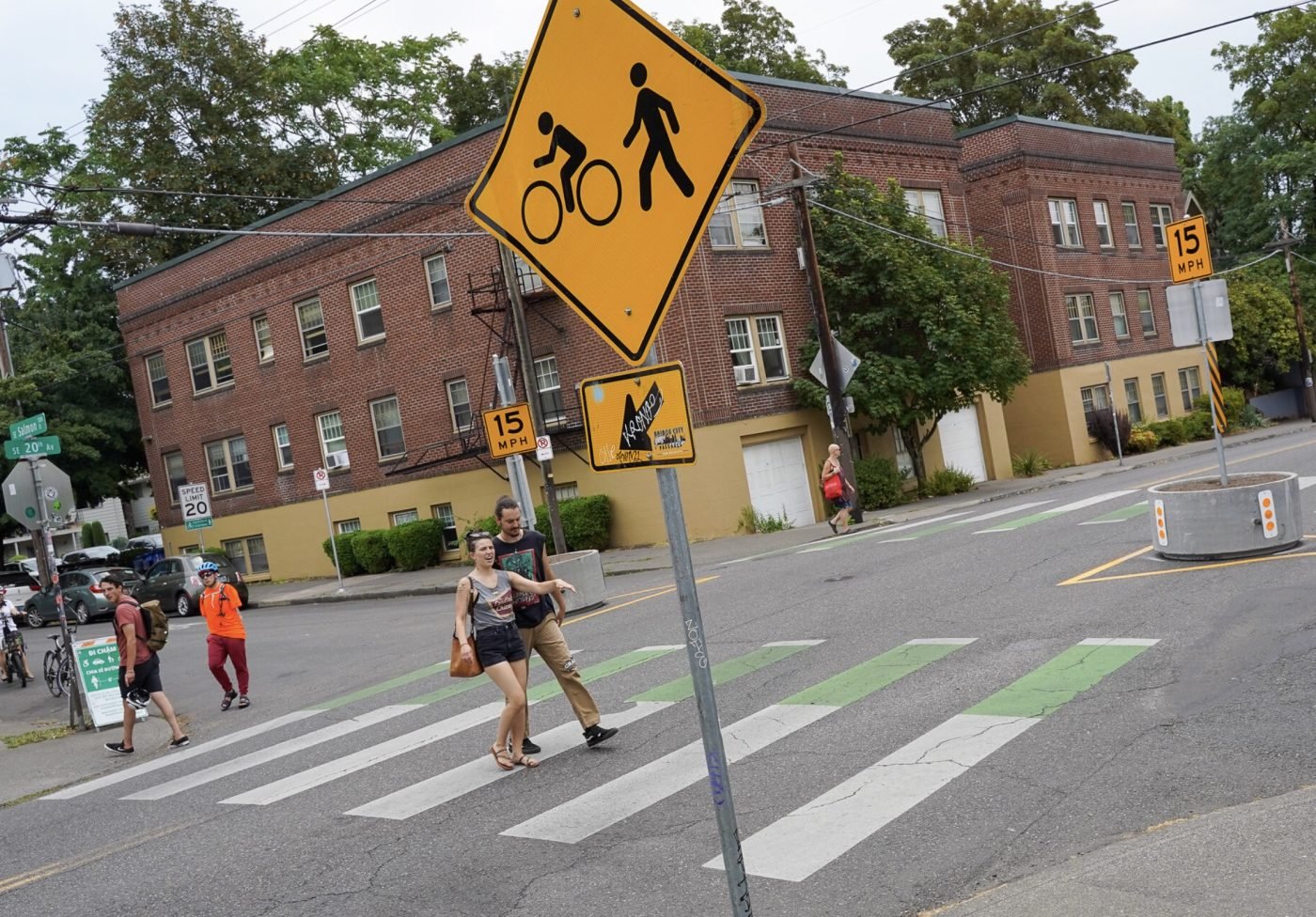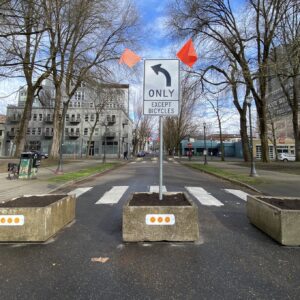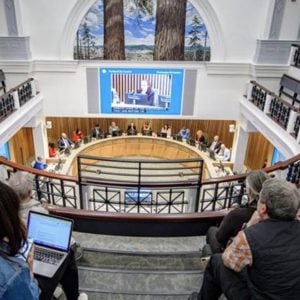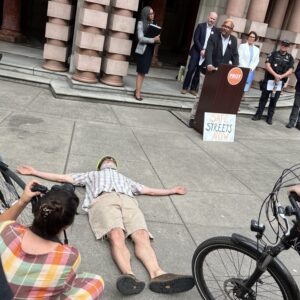With all the City of Portland budget action last week, there was one interesting tweak you might have missed. Among the 126 amendments proposed by the 12-member City Council, one of them earmarked $75,000 to traffic safety projects in District 4.
City Councilor Mitch Green had unspent funds in his office budget, and according to his Chief of Staff Maria Sipin, he chose to dedicate it to small street improvements in their district. “Instead of carrying it over for staffing and other expenditures,” Sipin shared with BikePortland, “We wanted to hold it to do some quick, high-impact pedestrian safety projects.”
Each council office is allocated about $1.3 million per year to cover expenses like security, a share of the recent City Hall remodel, staff salaries, and so on. The city’s fiscal year ends June 30th, and funding cannot be carried over to the next year. Sipin says each office was given several options with what they could do with unspent funds. They could: return it to the General Fund, where it could be used by any bureau; donate the money to District 1 to help get a district office constructed; or they could re-appropriate the funds to FY 2025-2056. Green’s office chose the last option.

“We heard from people in our people in our district that they sometimes need just a tiny piece of traffic calming, or they need a crosswalk restriped or a sign repaired — and they weren’t getting a quick response from PBOT [Portland Bureau of Transportation],” Sipin shared. “Earmarking it for some kind of safety projects is aligned with what we’re trying to do.”
Councilor Green is an everyday bicycle rider and has spoke often about safe streets as a candidate. During a speech at a traffic safety rally in November 2024, he spoke about almost being hit by a car driver on his way to the event. As more people drive larger cars to stay safe, “Those who do not drive are increasingly exposed to the collateral damage of this arms race,” Green said. He has also made the connection between safer streets and making walking and cycling a more attractive choice over driving.
Before putting forth the budget amendment Wednesday, Sipin explained they reached out to PBOT to run the idea by the agency. PBOT approved, so they went for it. The amendment passed with a unanimous 12-0 vote.
$75,000 isn’t a lot when it comes to major street projects, but it’s enough to make a significant dent in smaller, quick-build projects — and it’s especially needed given the crisis-level transportation budget. For context, PBOT says those large concrete planters used as modal filters (aka diverters) cost about $5,000 to build and install. A new crosswalk can cost about $3,000 and PBOT has said they can daylight an intersection for about $700-$800 in materials and labor. In 2023, PBOT striped a bike lane for two blocks and completed 24 other small “missing links” projects for just $300,000.
Sipin says since this is the first time they’ve tried this budgeting move, it will be considered a pilot. As far as where they’ll spend the money, they’ve got their eyes on a crosswalk project, but the exact location hasn’t been determined.
(Note: While Green is one of the architects of the Sidewalk Improvement and Paving Program (SIPP) that passed council earlier this month, these funds are separate from that program.)








Thanks for reading.
BikePortland has served this community with independent community journalism since 2005. We rely on subscriptions from readers like you to survive. Your financial support is vital in keeping this valuable resource alive and well.
Please subscribe today to strengthen and expand our work.
The $1.3 million is essentially a slush fund; I’m not opposed to slush funds, I think they are a great bit of minor corruption, even when they are “misspent”, as all corruption usually indicates where government policy is both fiscally failing and contradicting itself.
You say slush fund, I say discretionary spending. The councilors were always going to need some funds, if only to pay for staff. But I’m torn between putting tighter guardrails on them vs letting the councilors use them for exactly these sorts of small projects. There’s a certain amount of good retail politics that can come from, “hey, that speed bump you wanted? My office will find that ASAP”.
You say retail politics, I say corruption.
I’m glad Green did what he did, but am I the only person who thinks that given the city’s budget position, the commissioners allocated too much money to themselves?
No, and I’m sure the amount will increase as well. Easy to give yourself benefits when you are writing the rules:-(
Still, Green did something positive and even though I dislike his political outlook, he is at least doing actual things for constituents instead of holding endless committees.
It does kind of seem like a lot, but I’d really need to know how it was spent. If like 60% of it went to seismic updates at City Hall, that’s different than if they spent it all on Noguchi coffee tables for their offices.
Each council office is allocated about $1.3 million per year to cover expenses
David is right, its a straight up personal slush fund that gets replenished every year. 1.3 million tax dollars times 12 plus any increases equals quite a lot.
That money pays their staff, right? How many staff members does it take to run a councilor’s office?
Each district could share offices and have one person to great visitors and answer phones. Then the Councilors themselves do the rest. That’s what we elected them to do . . . . their job. Especially since they no longer have bureaus to run. So their work load has actually decreased from Councilors in the past.
I think it takes more than 1 person to run a councilor’s office. As someone who has tried to meet with a council member, lots of people and groups are competing for their attention. So staff and take meetings, set the schedule, summarize research for the councilor while the councilor works on other things (similar in or not).
My question is: for a comparably sized city, how many staff members could one expect a councilor to have?
It pays for anything. It could be staff, it could be furniture, it could be whatever..
Right. But staff is among the things that money pays for and I’m asking how many staffers a typical city council member has.
As many as the taxpayers will fund.
Well, when you get a lot of emails telling you what a corrupt idealogue you are, someone has to read them.
If Council wanted to make seismic updates to City Hall, they should allocate the funds to do so. They should not give themselves more money than they know what to do with, and then individually make the decision to spend some of their share on seismic retrofits. That’s not good governance.
The city is very tight on cash at the moment, and we’re setting precedent for the future. Allocating so much money to themselves just looks bad at a time we’re talking about cutting parks and other important services.
Cuts for thee, surplus for me.
No, I think trying to set budgets last year while reorganizing the city governance structure was probably an impossible task. The outlook now is much different than it was before too. If Green’s office had $75,000 left over at the end of the year, that is about 6% of a budget of $1.3M. Being off 6% is pretty good
I am not criticizing Green for not spending his entire allocation (I applaud that), I am criticizing council for giving themselves so much money in the first place (in January), knowing how tight the budget would be.
Damn straight.
https://www.oregonlive.com/politics/2025/01/portland-city-council-greenlights-46m-boost-for-council-mayoral-budgets.html
https://www.oregonlive.com/politics/2025/05/amid-citywide-budget-crunch-portland-council-offices-are-flush-with-cash.html
Damn straight squared. Those newspaper articles are worth reading. Thank you.
Relevant context from January, a couple weeks after the new council was launched:
> Councilors were given funds to pay for one staffer apiece when they entered office earlier this month. The mayor’s office was granted five staff members. All elected city officials agree it’s not enough to fulfill the level of policymaking and public engagement voters expect of them.
This led to emergency funding for an additional staff member and expenses, and was in response to a run of concerns dating to February 2024 that one staff member per councilor wouldn’t be enough. Management and Finance had proposed two staff members per councilor way back in November 2023, which the council passed at the time but which was cut to one by Wheeler’s budget passed by the prior council.
For contrast, Wheeler’s office had 17 staff and each member of the former council had 6-7 staff members.
I think this is a reasonable summary. One difference between council today and council of yore is that counselors are no longer overseeing bureaus, and there’s a lot more of them to share the (now much reduced) workload. And they get paid more.
I don’t know what the right level of staffing is, but it appears they overshot the mark in January. Furthermore, at a time when fiscal discipline is the more critical than ever, it is unseemly to take so much for yourself. That’s just my opinion of course, but clearly at least Novick agrees with me.
From the January article:
The majority of councilors argued that they already felt the consequences of being short-staffed. Councilor *** (not trying to make this personal) said her one staff member is responsible for everything from responding to emails to drafting legislation to attending community meetings.
“I’m afraid that he’s going to be so burnt out in the next month that he’s going to leave,” *** said. “So I implore you all to really think about good, effective, governance.”
I certainly hope that the Councilors have come to realize they won’t spontaneously combust if they pick up a phone, answer an email or (heaven forbid) actually attend a meeting on their own.
They get paid a lot, get to define their own duties and pay and if they are expecting to not participate in the day to day running of their office then they are horribly overpaid.
Have you talked to a councilor, or any of their staff? Do you go through a few thousand or so emails in your inbox a day? How often do you answer the phone each day? How many council sessions, listening sessions, constituent meetings do you think you could do each week by yourself AND be informed in any meaningful way on issues? They need one communications staffer to answer phone/emails and coordinate constituent biz, and one assistant to help meet with dfferent bureaus and officials, minimum. It’s an insane amount of work because they DON’T have just one or two bureaus to focus on – they must be on top of ALL issues confronting the city.
You think its a cakewalk? Let’s see your name on ballot next election.
I have written to my reps on a number of occasions since they’ve been elected. Neither Novick nor Morillo (nor their staff) responded to any of my messages, Koyama-Lane has responded to all, and it sounded like the messages came from her personally.
I don’t know how many emails they get each day, but I do know that at least one member of city council is able to handle the load (or at least a triaged portion of it) on her own. There could be one or two (or three if you want to get crazy) folks answering the phones and filtering emails for the whole lot of them.
Yes, they have to be on top of everything, but so did the previous council. No one needs to spend the time (or even has the opportunity to) go deep on the managerial issues each bureau faces, or handle the constituent needs associated with that role. That’s all handled by the mayor now, and council only deals with the bureaus at the very highest policy level, just like the previous council did on the bureaus that weren’t theirs.
I’m not saying they need no support; I’m saying they overdid their self-largesse in January, and it’s unseemly.
*Each council office is allocated about $1.3 million per year to cover expenses*
CCT: By my math that is 10 staffers at $100,000/ year, plus 300,000 in overhead expenses. Is this right? If yes, I will most definitely be on the ballot next year.
Yeah, but no you won’t.
That seems like a pretty low pay rate, and 300k seems low for overhead for everything.
This just doesn’t seem that scandalous.
Why would you want your Councilor to be insulated from the goings on of the City and it’s people. If your Councilor needs to be told what to do, when to do it or what happened at the meeting the staffer attended the immediate question is why have the Councilor and why not just let the staffer run the office and collect the big paycheck? They are supposed to be doing the people’s business, not having their staff do it while they run for re-election.
I didn’t say it would be a cakewalk. I think it is an involved position that is stressful at times, but not actually difficult IF ONE KNOWS WHAT THEY ARE DOING. Knowing what you are doing by having prior experience in business, leadership (you know, actual work and not volunteering which is not the same) or even being in administration being the large caveat. If you vote in people who need a lot of people telling them what to do and what their constituents think about on events, then that’s your fault. The taxpayers should not be on the hook hiring extra staffers to prop up Councilors who don’t know what to do or how to do it.
I suggest all of you declaring ‘WhY CaN’t Thy anSwER thEir Own Fones?’ contact your councilors https://www.portland.gov/help/contact-elected-official and meet with them to discuss your concerns about bloated staff. You will personally see how many people there are; ask how many emails or phone calls each councilor gets, and discuss if you think that work load is too light. Always better to investigate in person rather than spout off about something you know little of, correct? Do your own research, as they say. I’m sure there are savings to be had, and here’s your chance to make meaningful change – I was able to meet with all three of my councilors, so give it a whirl!
As to Watts declaring councilors do not need to be deeply informed… that’s a weird thing to want of the people voting on policy. Kinda like Congress, and that’s going GREAT! Just yesterday a congressman apologized for not even reading the budget bill he voted on. Didn’t even have a staffer give him the gist.
Yes, exactly — the interior dynamics of a bureau are no longer the concern of city council, nor are those dynamics available for observation to someone outside the mayor’s hierarchy.
Removing this level of involvement (and effort) was one of the primary goals of charter reform (not just something I “declared”). We went from having 20% of council deeply understanding a bureau to 0%, which was one of my concerns with the proposal, which I wrote about here.
So you enjoyed meeting with your Councilors directly and not a staffer? That’s great! Sounds like we agree that’s the best result possible
I also agree with you that we want to avoid the whole “We have to pass it to know what’s in it” Pelosi style legislation. Do you think the councilor should read the bills or be told what’s in them by a staffer who has?
I’m a bit confused as it seems like you want and enjoy your Councilor being involved and personally knowledgeable on subjects , yet are mocking those of us who think the same.
I went through the staffers, who answered the request, triaged what seemed more or less urgent, and made the schedule. I’m just a bozo on the bus, so imagine how many people with actual important biz there are to sort through. So a councilor could spend all day just doing that. There may, indeed, be a gatekeeper for all the councilors in each district… who still has to cordinate with each councilor’s schedule. I don’t want a staffer picking who gets to meet (had enough of that under Wheeler), but when is fine.
Maybe that’s not full time, and that person could also fetch info a councilor asks for from some desk deep in a bureau – but having met two of the assistants, they have a full plate and running a calendar may not be the best use of salary.
As to policy – how do you think most governments work? Even under the old system, commissioners rarely dug deeper than what staff laid before them, whether it was a commissioner’s priority or the bureau’s. Several councilor have taken far deeper dives into bureau crypts than commissioners did under the old setup. Quite frankly, I would rather have a larger councilor’s staff asking questions than a large bureau staff obfuscating the answers.
And my point still stands: go meet and see for yourself. Report back and let me know where you think improvements can be made. I know of at least 3 councilors who would welcome cost savings ideas.
Many of us have had discussions with councilors about ‘surplus’ funds they are dispersing – appreciated, but not a reliable or permanent fix for some of these issues. And yes, if people keep hearing about this extra money, they will start to request it be eliminated.
Mitch Green continues to impress. District 4 needed representation on the council and Green is providing exactly what I’d want out of a representative: the all-too-rare combination of pragmatic and progressive.
The inner eastside District 3 had an absurd number of commissioners under the prior structure, and I’m glad we are finally starting to invest elsewhere in the city. Not a single dollar should be spent on new infrastructure in District 3 until we bring the rest of the city, particularly Districts 1 and 4, up to par.
Name one.
Recent commissioners in D3: Mingus Mapps, Carmen Rubio, Rene Gonzalez (technically I think he’s in the boundaries of D1 but in Eastmoreland, which is pretty much surrounded on al sides by D3 lands), Steve Novick.
Recent commissioners not in D3: Chloe Eudaly (D2), Dan Ryan (D2), Jo Ann Hardesty (D1), Nick Fish (D4)
Recent commissioners I’m not sure about or don’t remember: Amanda Fritz, Dan Saltzman
That’s 4 of the most recent 10 commissioners (at least) who lived in or right on the boundaries of D3, including 3 of the 4 most recent commissioners. I’ll add Eudaly and Ryan to that as people who lived in the inner eastside close to D3. Pretty much only Nick Fish and Jo Ann Hardesty were significantly removed from its area.
I may have misunderstood your claim; I thought you were saying that many of the commissioners lived in the inner eastside, when in fact you may have been saying they lived within the boundaries of D3 (which contains the inner eastside). Those are very different things. My bad.
No worries. Yep I was saying D3, not the inner eastside.
Was it impressive when Green demanded PSU not press charges against the vandals that caused $1.2 million dollars of damage to the university library or he would cut off city of Portland funds? He’s behaving like a Socialist mini-Trump.
https://www.oregonlive.com/politics/2025/04/portland-city-councilor-threatens-psu-project-funding-over-pro-palestinian-occupation-response.html
Mitch Green Makes a ThreatSubstack · Recalibrate Portland with Max Steele30+ likes · 1 month ago
I don’t opine on situations where I don’t know enough to make an informed judgment.
Read those articles and the you will be able to. Mitch Geeen’s behavior was embarrassing in my opinion, possibly illegal.
Extremely Trumpian behavior. I find it concerning and I think we should expect better. We can’t allow this kind of behavior just because we agree with someone politically.
I thought it was impressive. Your mis-characterization of the events notwithstanding. Legal charges were already dropped, and the students were being collectively punished. And deciding how to spend funds is literally part of the job, or it wouldn’t have been much of a threat.
So you support Trump letting off the January 6 criminals? This is the same thing Mitch Green is trying to do with the PSU vandals…..
I like things that I agree with politically, and I don’t like the things my political enemies do. I don’t know why you think it’s a gotcha, if I did like what all my political enemies did, there wouldn’t be politics.
That said, I like it when the people I elect use the authority I elected them to use to do things that I like. In the case of the Jan 6 morons, doing pardons is an explicit power of the president. Probably shouldn’t be, but it is. It’s not any less legal just because you don’t like who he used it on. And I wish more Democrats would do exactly the same when they were in power.
There is no contradiction here or hypocrisy. I like it when people I elect do things I like.
Prior to the new government structure, 70%-80% of city discretionary resources were being spent on downtown, far more than what was being generated through taxes, according to the city budget mapping project. The only part of town that got it’s “fair share” (taxes = benefits) was inner northeast (NECN), all other parts of town were basically being ripped off, East Portland and North Portland most of all.
I’m looking forward to seeing the City Auditor’s report as to how that budget unfairness is changing, if downtown is no longer getting the lion’s share of city resources or not, and if each district is getting more resources than before.
So it sounds like you’re affirming that downtown was colonizing the resources of the rest of the city and I would argue that tax colonization is what drove the impetuous for the annexations that resulted in the city as it looks today.
I too am curious if these new champions of equity will continue the pillaging or if it will be a case of the more things change, the more that stay the same.
Councilor Green deserves a big “Thank You” for this.
You can reach him here.
https://www.portland.gov/council/districts/4/mitch-green
councilor.green@portlandoregon.gov
Ted Buehler
Of course the very first thing the newly constituted city council did back in January 16, 2025, was double their office staffing at $11.3million out of the city’s contingency fund. At that point the brand-spanking-new council members hadn’t been in office long enough to know what demands would be made on staffing resources, but they knew they needed more to the tune of $11.3 million. God forbid they answer their own phones or greet a constituent in person.
Did you vote for the charter reform? Many predicted the expansion to 3 councilors per district would be both chaotic and expensive but those concerns were dismissed by the Julia Meier and her Charter Commission. They were an unelected, non-diverse, non-representative group unfortunately and they produced a poor charter…yet Portlanders were so desperate for change they voted for it. No we are suffering the consequences and will for years going forward.
You people act like the job is just sitting and waiting for a phone call that happens once or twice a day.
The taxpayers money. Fixed it for you.
He’s not giving anything.